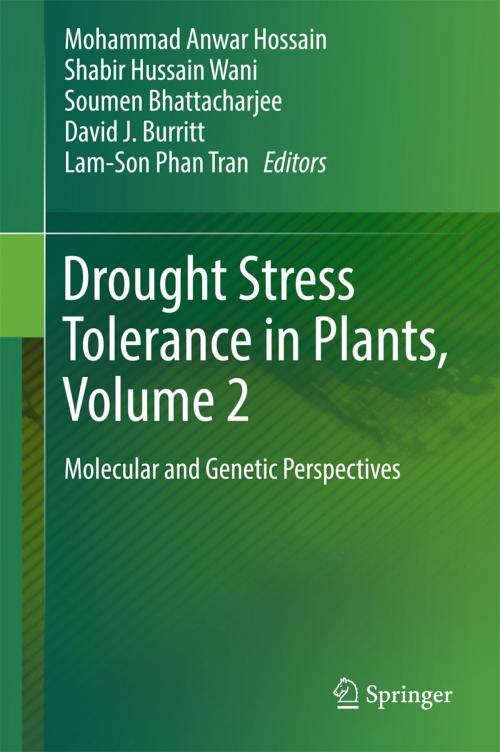Drought Stress Tolerance in Plants, Vol 2
Molecular and Genetic Perspectives
Nonfiction, Science & Nature, Science, Biological Sciences, Botany, Technology, Agriculture & Animal Husbandry| Author: | ISBN: | 9783319324234 | |
| Publisher: | Springer International Publishing | Publication: | August 24, 2016 |
| Imprint: | Springer | Language: | English |
| Author: | |
| ISBN: | 9783319324234 |
| Publisher: | Springer International Publishing |
| Publication: | August 24, 2016 |
| Imprint: | Springer |
| Language: | English |
Drought is one of the most severe constraints to crop productivity worldwide, and thus it has become a major concern for global food security. Due to an increasing world population, droughts could lead to serious food shortages by 2050. The situation may worsen due to predicated climatic changes that may increase the frequency, duration and severity of droughts. Hence, there is an urgent need to improve our understanding of the complex mechanisms associated with drought tolerance and to develop modern crop varieties that are more resilient to drought. Identification of the genes responsible for drought tolerance in plants will contribute to our understanding of the molecular mechanisms that could enable crop plants to respond to drought. The discovery of novel drought related genes, the analysis of their expression patterns in response to drought, and determination of the functions these genes play in drought adaptation will provide a base to develop effective strategies to enhance the drought tolerance of crop plants. Plant breeding efforts to increase crop yields in dry environments have been slow to date mainly due to our poor understanding of the molecular and genetic mechanisms involved in how plants respond to drought. In addition, when it comes to combining favourable alleles, there are practical obstacles to developing superior high yielding genotypes fit for drought prone environments. Drought Tolerance in Plants, Vol 2: Molecular and Genetic Perspectives combines novel topical findings, regarding the major molecular and genetic events associated with drought tolerance, with contemporary crop improvement approaches. This volume is unique as it makes available for its readers not only extensive reports of existing facts and data, but also practical knowledge and overviews of state-of-the-art technologies, across the biological fields, from plant breeding using classical and molecular genetic information, to the modern omic technologies, that are now being used in drought tolerance research to breed drought-related traits into modern crop varieties. This book is useful for teachers and researchers in the fields of plant breeding, molecular biology and biotechnology.
Drought is one of the most severe constraints to crop productivity worldwide, and thus it has become a major concern for global food security. Due to an increasing world population, droughts could lead to serious food shortages by 2050. The situation may worsen due to predicated climatic changes that may increase the frequency, duration and severity of droughts. Hence, there is an urgent need to improve our understanding of the complex mechanisms associated with drought tolerance and to develop modern crop varieties that are more resilient to drought. Identification of the genes responsible for drought tolerance in plants will contribute to our understanding of the molecular mechanisms that could enable crop plants to respond to drought. The discovery of novel drought related genes, the analysis of their expression patterns in response to drought, and determination of the functions these genes play in drought adaptation will provide a base to develop effective strategies to enhance the drought tolerance of crop plants. Plant breeding efforts to increase crop yields in dry environments have been slow to date mainly due to our poor understanding of the molecular and genetic mechanisms involved in how plants respond to drought. In addition, when it comes to combining favourable alleles, there are practical obstacles to developing superior high yielding genotypes fit for drought prone environments. Drought Tolerance in Plants, Vol 2: Molecular and Genetic Perspectives combines novel topical findings, regarding the major molecular and genetic events associated with drought tolerance, with contemporary crop improvement approaches. This volume is unique as it makes available for its readers not only extensive reports of existing facts and data, but also practical knowledge and overviews of state-of-the-art technologies, across the biological fields, from plant breeding using classical and molecular genetic information, to the modern omic technologies, that are now being used in drought tolerance research to breed drought-related traits into modern crop varieties. This book is useful for teachers and researchers in the fields of plant breeding, molecular biology and biotechnology.















